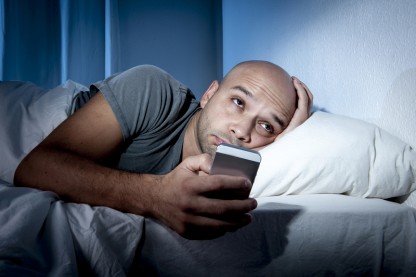Home Sleep Remedies: How the Color of Light Affects Your Sleep
If you suffer from insomnia or disrupted sleep, you have likely tried a whole list of home sleep remedies. But did you know that the specific kind of light you’re exposed to at night can make a big difference in how you sleep?
 There is nothing more frustrating than a restless night and lack of sleep. Among the many options for home sleep remedies is watching your light exposure at night.
There is nothing more frustrating than a restless night and lack of sleep. Among the many options for home sleep remedies is watching your light exposure at night.
The effects of light exposure at night
Light affects our circadian rhythms and melatonin production. Under normal circumstances, when the sun sets, melatonin, a sleep-promoting hormone, is produced. Melatonin treatment helps facilitate sleep and reduce the time it takes to fall asleep.[1]
In the modern world, however, many people are exposed to bright light long after sunset and into the night. Computers, phone screens, and late office hours are all sources of artificial nighttime light. This light exposure can suppress melatonin production and shorten the duration of melatonin secretion. One study found that light exposure between dusk and bedtime can reduce melatonin by 71.4% before sleep.[1] This makes it harder to fall asleep and can contribute to insomnia and other sleep disorders. Even dim light has this effect. Researchers conclude that, “minor changes in indoor lighting conditions may have a major impact on circadian entrainment and its dysregulation.”[2]
Exposure to light at night and the resulting melatonin disruption doesn’t only affect our sleep. It can also alter mood and contribute to cardiovascular disease and even cancer. Many studies have found that people who are awake at night, such as shift workers, have a higher risk for these serious conditions.[3,4]
Blue light vs. red light
While light exposure in general has the ability to affect our circadian rhythm and our health, research shows that our bodies respond differently to different wavelengths. Shorter wavelengths (blue light) seem to have a much more profound and negative impact on our circadian rhythms than longer wavelengths (red light) do.
Blue light exposure in the evening significantly reduces melatonin expression, and causes a delay in sleep much more so than red light does.[5] Exposure to two hours of blue light in the evening also alters brain wave activity during sleep as measured by an EEG.[6]
Avoiding blue light before bedtime
Here are some home sleep remedies that will help you avoid blue light before bedtime.
- Stop using your computer, tablet, cell-phone, and TV at least an hour before you wish to fall asleep. These devices all emit bright, blue light, so keep them out of your bedroom and out of your nighttime routine, if possible.
- If you need to use your computer or electronic device in the evenings, try out a program such as Flux. Flux alters the screen so that it emits red light, instead of blue, in the evenings. It can be programmed to match the outside light in your area, so that your screen automatically changes when the sun goes down.
- Use dim, red lighting before you go to sleep. Find pleasing red shades or red light bulbs to light your home for the last few hours before sleep. Choose red night lights for when you need to get up in the middle of the night.
- Try using red or amber tinted glasses, like these, at night. Multiple studies have found that using eyewear that filters out blue light in the evenings can be effective at preventing the suppression of melatonin at night.[4,7] This can be especially helpful for those people that have to be awake and functioning in artificial light at night, such as shift workers.
Share your experience
Do you have tips for avoiding blue light at night? What other home sleep remedies do you know of that are effective? Share your thoughts in the comments section below.
[1] J Clin Endocrinol Metab. 2011 Mar;96(3):E463-72.
[2] J Physiol. 2000 Aug 1;526 Pt 3:695-702.
[3] J Neurosci. 2013 Aug 7;33(32):13081-7.
[4] J Clin Endocrinol Metab. 2005 May;90(5):2755-61.
[5] Sleep Med Clin. 2009 Jun;4(2):165-177.


 Look Beyond the Scale
Look Beyond the Scale  Weighted Blanket Benefits
Weighted Blanket Benefits  How to Sleep With Sciatica
How to Sleep With Sciatica 